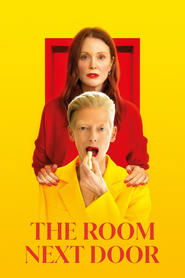— I love fruit.
Quite literally laughable in the cack-handed manner in which it conveys its Big Ideas, from the Vietnam war vet's swig of beer; the two protagonists jobs ("I live with those wars every day!"); Martha's approach to her cancer; the countless references to other films and book; and then the groan-inducing way the film's many quotations are explicitly cited later on, just in case you didn't get the reference. yet, of course, they don't illuminate or help then — if you haven't come across Faulkner, The Dead or Buster Keaton before (and/or you don't happen to understand their position in Western culture), these underlines come across as precious, pretentious and emotionally shallow.
Indeed, the film's childish need to be 'understood' is a consistent issue throughout, almost as if Almodóvar's clever and legalistic solution to "show, don't tell" was to show and then tell the audience twice. Did we need to be told three times that the policeman is a religious nutjob? Did it matter even the first time?
No doubt some of these issues have their proximate cause in the original novel by Sigrid Nunez, but I hazard that the clunkiness of this adaptation cannot be laid at her feet. Did the book really have an extended sequence of them arriving at an Airbnb and sharing banalities such as, "oh, I think this is the way" immediately before reaching the door, and "this is much better than the photographs"? Did the book really take the Cunningham character as seriously as the film does, with his sophomoric rant about "the far right" and "neoliberalism" aimed right at the viewer? Even if they are present in the book, I have a lingering suspicion that there would be some way in which the effect is somewhat different.
In factr, given Julianne Moore's previous movie, May December, was quite obviously a bone-dry send-up of its genre, I was on the lookout for any sign whatsoever that the film's graceless affect was deliberately camp in some way, yet the only indirect sign was the way that the characters so blithely inhabit their extremely affluent surroundings whilst preaching about climate change and how difficult their lives are.
How one ultimately feels about The Room Next Door may depend less on politics or ideology than how they read the scene in which Martha and Ingrid speak in hushed and paranoid tones about the perils of surfing “the dark web.” Is it deliberate and delicious camp? Or evidence of a singular tragicomic sensibility getting lost in translation? [The] tension here between plangency and stiltedness generates a rich but amorphous atmosphere—a twilight zone of tonal ambiguity somewhere between Zen koans and New Yorker cartoon captions.
— Adam Nayman (The New Republic)
Synopsis: Ingrid and Martha were close friends in their youth, when they worked together at the same magazine. Ingrid went on to become an autofiction novelist while Martha became a war reporter, and they were separated by the circumstances of life. After years of being out of touch, they meet again in an extreme but strangely sweet situation.

